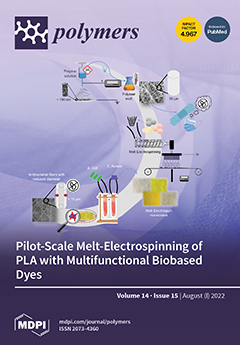Partially Bio-Based and Biodegradable Poly(Propylene Terephthalate-Co-Adipate) Copolymers: Synthesis, Thermal Properties, and Enzymatic Degradation Behavior
IF 4.7
3区 工程技术
Q1 POLYMER SCIENCE
引用次数: 0
Abstract
A series of partially bio-based and biodegradable poly(propylene terephthalate-co-adipate) (PPTA) random copolymers with different components were prepared by the melt polycondensation of petro-based adipic acid and terephthalic acid with bio-based 1,3-propanediol. The microstructure, crystallization behavior, thermal properties, and enzymatic degradation properties were further investigated. The thermal decomposition kinetics was deeply analyzed using Friedman’s method, with the thermal degradation activation energy ranging from 297.8 to 302.1 kJ/mol. The crystallinity and wettability of the copolymers decreased with the increase in the content of the third unit, but they were lower than those of the homopolymer. The thermal degradation activation energy E, carbon residue, and reaction level n all showed a decreasing trend. Meanwhile, the initial thermal decomposition temperature (Td) was higher than 350 °C, which can meet the requirements for processing and use. The PPTA copolymer material still showed excellent thermal stability. Adding PA units could regulate the crystallinity, wettability, and degradation rate of PPTA copolymers. The composition of PPTA copolymers in different degradation cycles was characterized by 1H NMR analysis. Further, the copolymers’ surface morphology during the process of enzymatic degradation also was observed by scanning electron microscopy (SEM). The copolymers’ enzymatic degradation accorded with the surface degradation mechanism. The copolymers showed significant degradation behavior within 30 days, and the rate increased with increasing PA content when the PA content exceeded 45.36%.部分生物基和生物降解聚对苯二甲酸丙二酯共聚物:合成、热性能和酶降解行为
通过石油基己二酸和对苯二甲酸与生物基 1,3 丙二醇的熔融缩聚,制备了一系列不同组分的部分生物基、可生物降解的聚对苯二甲酸丙二醇酯(PPTA)无规共聚物。对其微观结构、结晶行为、热性能和酶降解性能进行了进一步研究。采用弗里德曼法对热分解动力学进行了深入分析,热降解活化能在 297.8 至 302.1 kJ/mol 之间。共聚物的结晶度和润湿性随第三单元含量的增加而降低,但均低于均聚物。热降解活化能 E、碳残留量和反应水平 n 均呈下降趋势。同时,初始热分解温度(Td)高于 350 ℃,可以满足加工和使用要求。PPTA 共聚物材料仍然表现出优异的热稳定性。添加 PA 单元可以调节 PPTA 共聚物的结晶度、润湿性和降解率。通过 1H NMR 分析鉴定了 PPTA 共聚物在不同降解循环中的组成。此外,还利用扫描电子显微镜(SEM)观察了共聚物在酶降解过程中的表面形态。共聚物的酶降解符合表面降解机理。共聚物在 30 天内表现出明显的降解行为,当 PA 含量超过 45.36% 时,降解速率随 PA 含量的增加而增加。
本文章由计算机程序翻译,如有差异,请以英文原文为准。
求助全文
约1分钟内获得全文
求助全文
来源期刊

Polymers
POLYMER SCIENCE-
CiteScore
8.00
自引率
16.00%
发文量
4697
审稿时长
1.3 months
期刊介绍:
Polymers (ISSN 2073-4360) is an international, open access journal of polymer science. It publishes research papers, short communications and review papers. Our aim is to encourage scientists to publish their experimental and theoretical results in as much detail as possible. Therefore, there is no restriction on the length of the papers. The full experimental details must be provided so that the results can be reproduced. Polymers provides an interdisciplinary forum for publishing papers which advance the fields of (i) polymerization methods, (ii) theory, simulation, and modeling, (iii) understanding of new physical phenomena, (iv) advances in characterization techniques, and (v) harnessing of self-assembly and biological strategies for producing complex multifunctional structures.
文献相关原料
| 公司名称 | 产品信息 | 采购帮参考价格 |
|---|
 求助内容:
求助内容: 应助结果提醒方式:
应助结果提醒方式:


